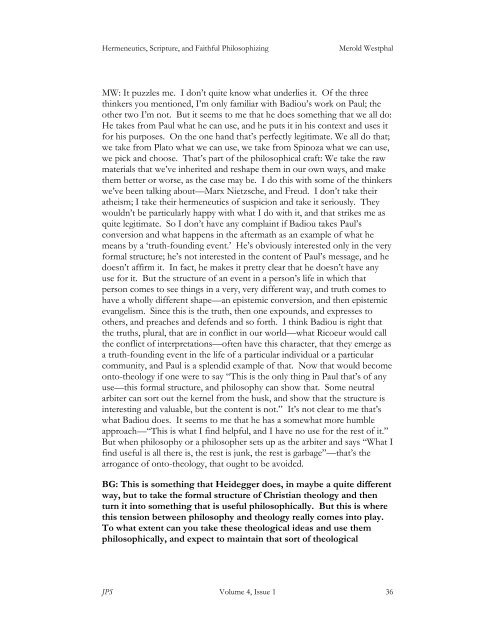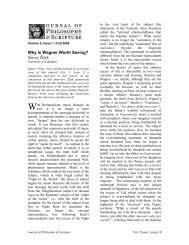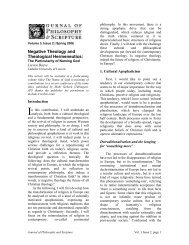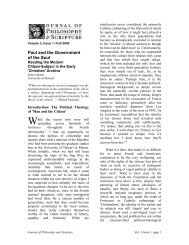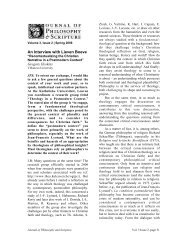interview with Merold Westphal - Journal of Philosophy and Scripture
interview with Merold Westphal - Journal of Philosophy and Scripture
interview with Merold Westphal - Journal of Philosophy and Scripture
You also want an ePaper? Increase the reach of your titles
YUMPU automatically turns print PDFs into web optimized ePapers that Google loves.
Hermeneutics, <strong>Scripture</strong>, <strong>and</strong> Faithful Philosophizing <strong>Merold</strong> <strong>Westphal</strong><br />
MW: It puzzles me. I don’t quite know what underlies it. Of the three<br />
thinkers you mentioned, I’m only familiar <strong>with</strong> Badiou’s work on Paul; the<br />
other two I’m not. But it seems to me that he does something that we all do:<br />
He takes from Paul what he can use, <strong>and</strong> he puts it in his context <strong>and</strong> uses it<br />
for his purposes. On the one h<strong>and</strong> that’s perfectly legitimate. We all do that;<br />
we take from Plato what we can use, we take from Spinoza what we can use,<br />
we pick <strong>and</strong> choose. That’s part <strong>of</strong> the philosophical craft: We take the raw<br />
materials that we’ve inherited <strong>and</strong> reshape them in our own ways, <strong>and</strong> make<br />
them better or worse, as the case may be. I do this <strong>with</strong> some <strong>of</strong> the thinkers<br />
we’ve been talking about—Marx Nietzsche, <strong>and</strong> Freud. I don’t take their<br />
atheism; I take their hermeneutics <strong>of</strong> suspicion <strong>and</strong> take it seriously. They<br />
wouldn’t be particularly happy <strong>with</strong> what I do <strong>with</strong> it, <strong>and</strong> that strikes me as<br />
quite legitimate. So I don’t have any complaint if Badiou takes Paul’s<br />
conversion <strong>and</strong> what happens in the aftermath as an example <strong>of</strong> what he<br />
means by a ‘truth-founding event.’ He’s obviously interested only in the very<br />
formal structure; he’s not interested in the content <strong>of</strong> Paul’s message, <strong>and</strong> he<br />
doesn’t affirm it. In fact, he makes it pretty clear that he doesn’t have any<br />
use for it. But the structure <strong>of</strong> an event in a person’s life in which that<br />
person comes to see things in a very, very different way, <strong>and</strong> truth comes to<br />
have a wholly different shape—an epistemic conversion, <strong>and</strong> then epistemic<br />
evangelism. Since this is the truth, then one expounds, <strong>and</strong> expresses to<br />
others, <strong>and</strong> preaches <strong>and</strong> defends <strong>and</strong> so forth. I think Badiou is right that<br />
the truths, plural, that are in conflict in our world—what Ricoeur would call<br />
the conflict <strong>of</strong> interpretations—<strong>of</strong>ten have this character, that they emerge as<br />
a truth-founding event in the life <strong>of</strong> a particular individual or a particular<br />
community, <strong>and</strong> Paul is a splendid example <strong>of</strong> that. Now that would become<br />
onto-theology if one were to say “This is the only thing in Paul that’s <strong>of</strong> any<br />
use—this formal structure, <strong>and</strong> philosophy can show that. Some neutral<br />
arbiter can sort out the kernel from the husk, <strong>and</strong> show that the structure is<br />
interesting <strong>and</strong> valuable, but the content is not.” It’s not clear to me that’s<br />
what Badiou does. It seems to me that he has a somewhat more humble<br />
approach—“This is what I find helpful, <strong>and</strong> I have no use for the rest <strong>of</strong> it.”<br />
But when philosophy or a philosopher sets up as the arbiter <strong>and</strong> says “What I<br />
find useful is all there is, the rest is junk, the rest is garbage”—that’s the<br />
arrogance <strong>of</strong> onto-theology, that ought to be avoided.<br />
BG: This is something that Heidegger does, in maybe a quite different<br />
way, but to take the formal structure <strong>of</strong> Christian theology <strong>and</strong> then<br />
turn it into something that is useful philosophically. But this is where<br />
this tension between philosophy <strong>and</strong> theology really comes into play.<br />
To what extent can you take these theological ideas <strong>and</strong> use them<br />
philosophically, <strong>and</strong> expect to maintain that sort <strong>of</strong> theological<br />
JPS Volume 4, Issue 1 36


